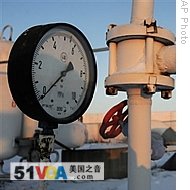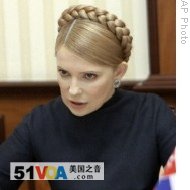Washington
03 February 2009
 |
| A gas pressure gauge is seen at a snow-covered transit point on the main pipeline from Russia in the village of Boyarka, near Kyiv, Ukraine, 06 Jan 2009 |
The crisis began when Russia stopped selling gas to Ukraine on January 1 and then accused Kyiv of siphoning off natural gas bound for Europe. Moscow turned off the taps entirely on January 7, despite Ukrainian President Viktor Yuschenko's denial of Russia's claims.
The dispute was finally settled January 19, but not before gas supplies to 18 European countries were severely disrupted during one of the coldest winters in years.
Europe receives about a quarter of its natural gas from Gazprom, the Russian gas monopoly. Eighty percent of the gas it ships west passes through the same pipelines that supply Ukraine.
Experts, such as Robert Legvold of Columbia University in New York, say the recent crisis highlighted the divisions in the Ukrainian political leadership and underlined the animosity between President Yuschenko and Prime Minister Yulia Tymoshenko - who were allies in the early days of the 2004 "Orange Revolution".
 |
| Ukraine's President Viktor Yushchenko talks during a press conference at the EU Commission headquarters in Brussels, 27 Jan 2009 |
Many analysts, including Katinka Barysch with the London-based Center for European Reform, say the dispute with Russia and the unsettled political climate have damaged Ukraine's chances of becoming a member of the European Union and the North Atlantic Treaty Organization, or NATO.
 |
| Ukraine's Prime Minister Yulia Tymoshenko in Kyiv, Ukraine, 14 Jan 2009 |
David Marples from the University of Alberta in Canada agrees.
"Ukraine is playing for very high stakes with the European Union," said David Marples. "It would like ultimately to be a member of that union. And related to that, it would also like to be a member of NATO, which is meeting periodically and keeps saying, 'Well, not yet; not yet, but eventually you will be a member of NATO as well.' So Ukraine cannot really afford to antagonize the Europeans too much, especially at a time now when relations with Russia have reached this kind of bleak level."
Marples says that for Ukraine to succeed politically, economically and in its budding relationship with Europe, President Yushchenko and Prime Minister Tymoshenko must resolve their differences.
"A stable government is the most important thing for Ukraine right now," he said. "And it doesn't really matter whether it's an 'Orange' government or a 'Blue' government or whatever. It just needs to be a parliament that stays in office more than a year at a time, and a relationship between the president and the parliament that is at least cordial - not this dreadful thing where they are accusing each other of treachery and all kinds of things. I could hardly imagine a worse situation."
Analysts also say the political feuding in Ukraine plays into Russia's hands and might create new opportunities for Moscow to try to exert more influence in the former Soviet republic.